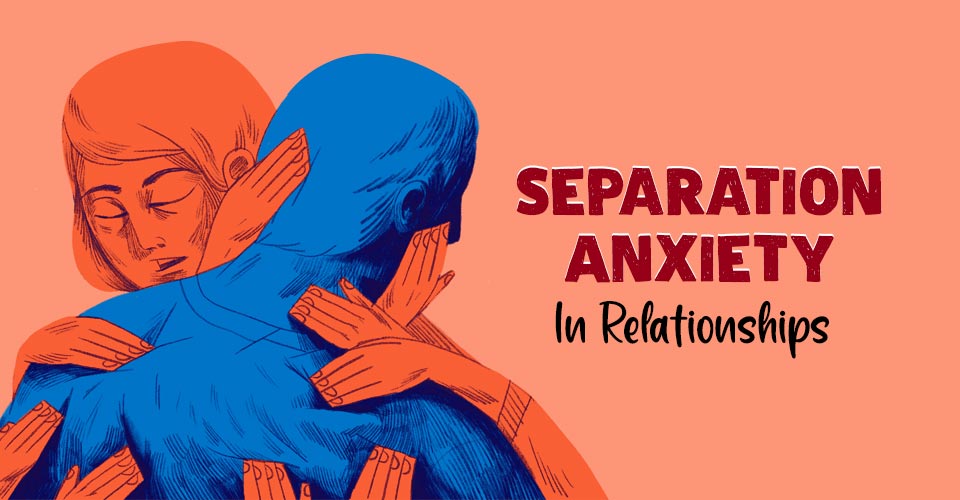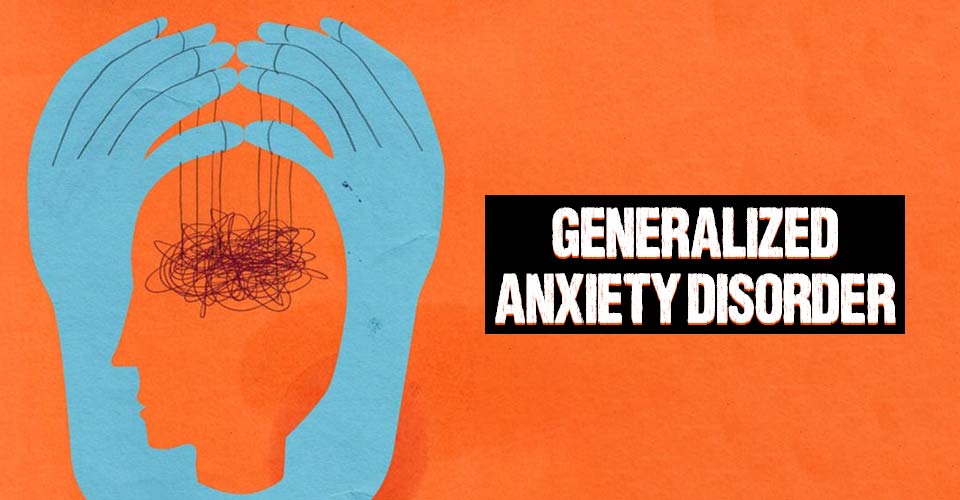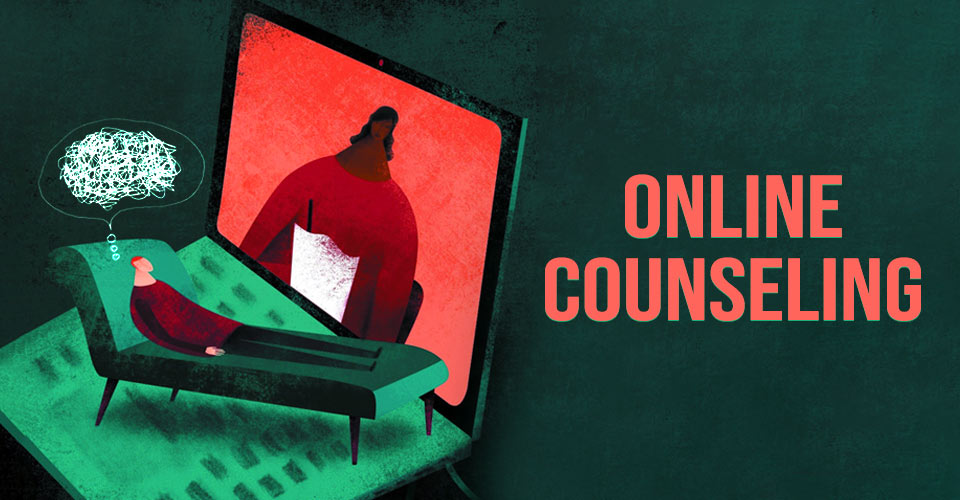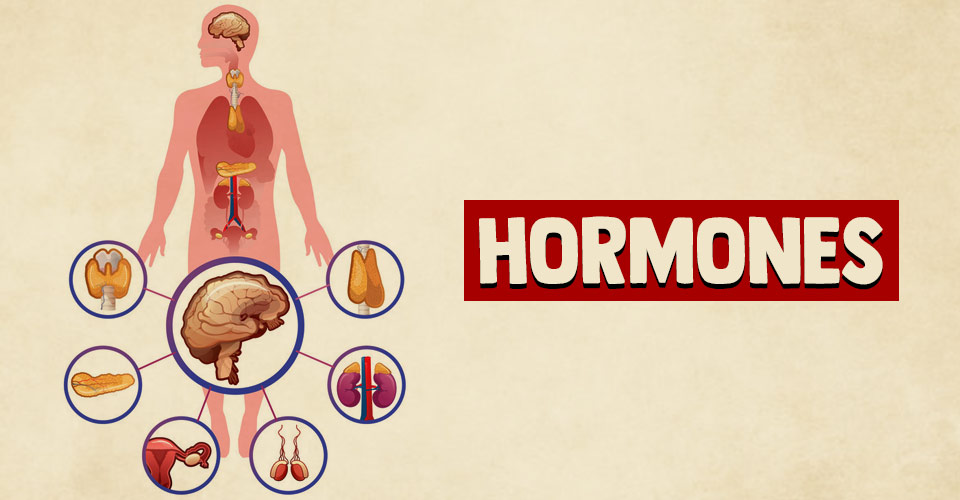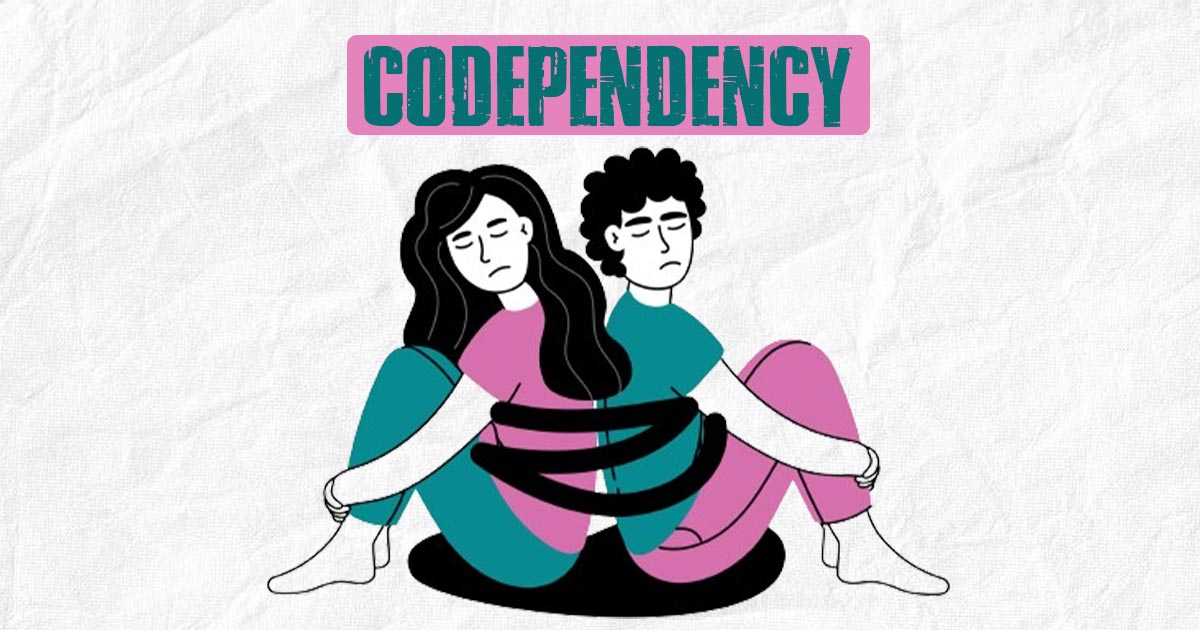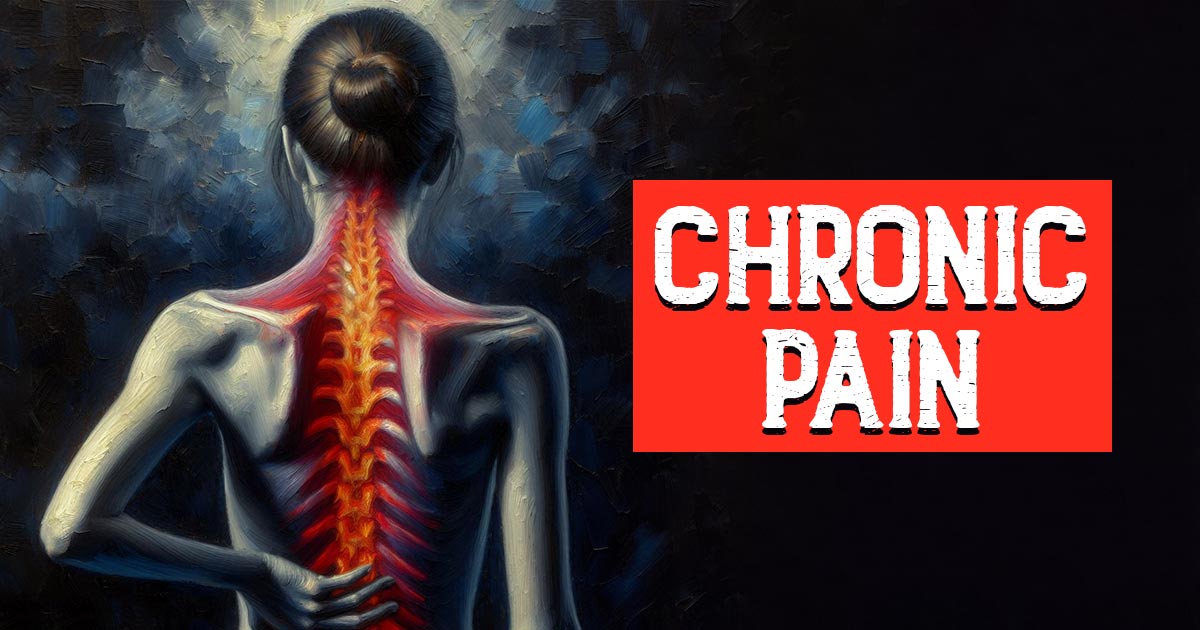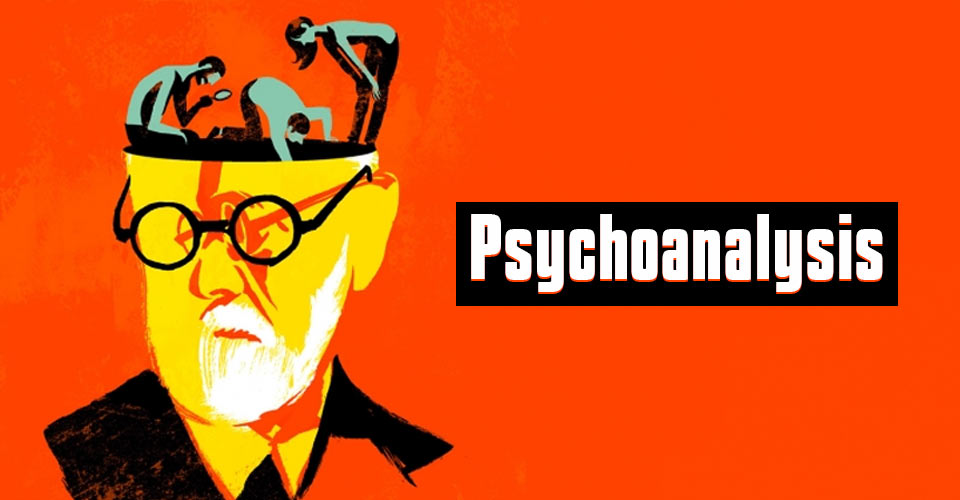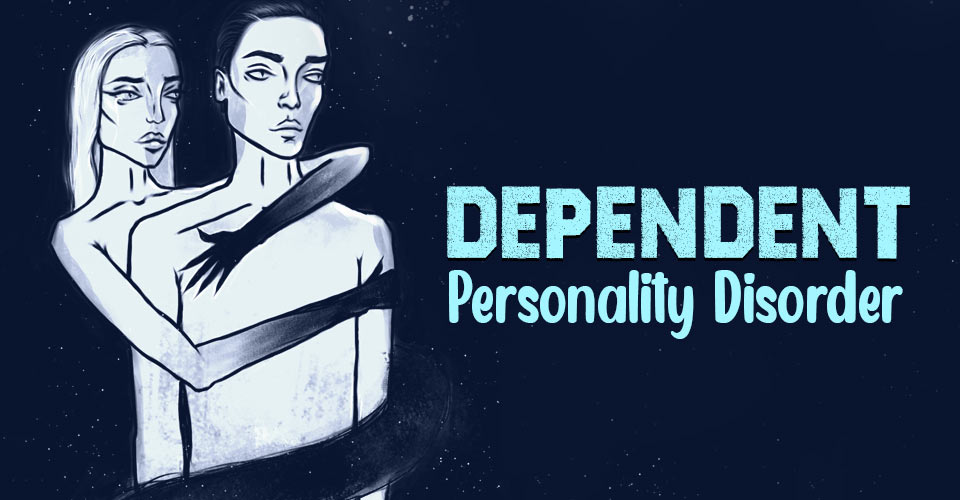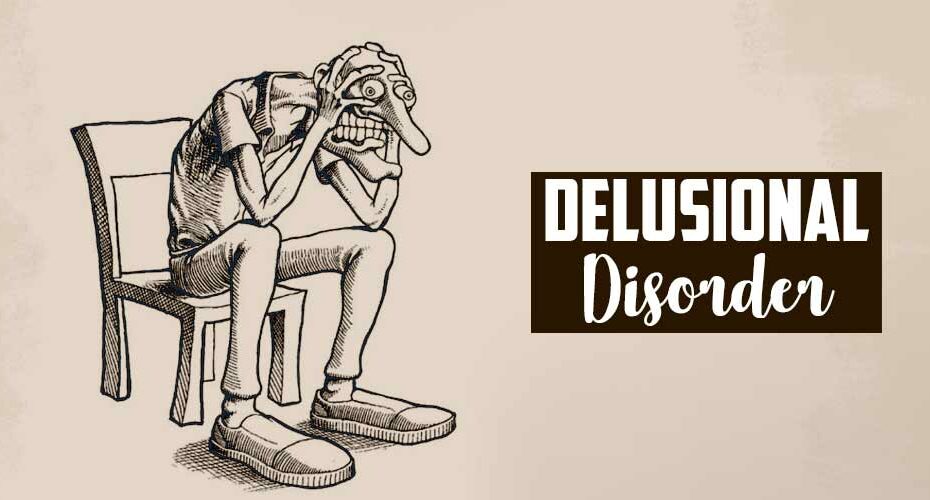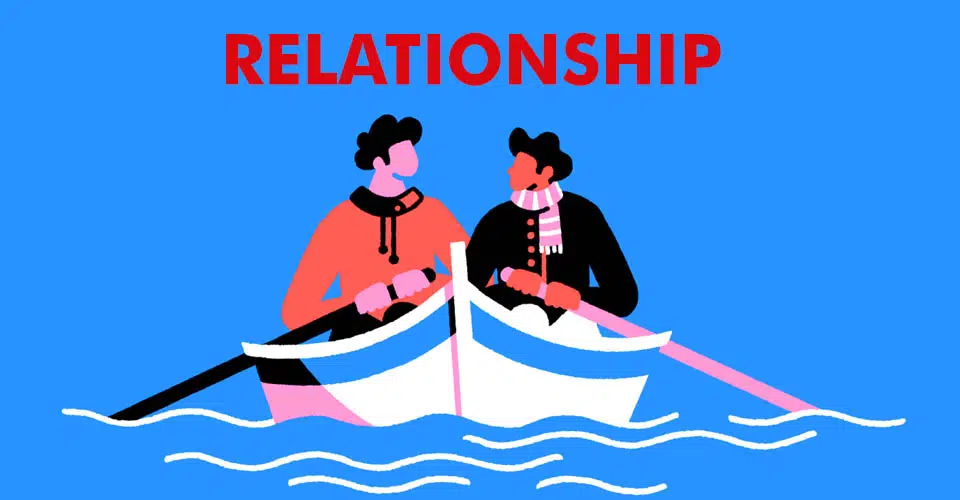Separation anxiety in relationships manifests as a recurrent and intense fear of separation and abandonment, involving a partner or a loved one.
What Is Separation Anxiety In Relationships?
Separation anxiety is a type of mental health condition in which a person experiences persistent and excessive distress related to actual or anticipated separation from an attachment figure 1 Feriante, J., & Bernstein, B. (2022). Separation Anxiety. In StatPearls. StatPearls Publishing. Available from: https://pubmed.ncbi.nlm.nih.gov/32809628/ (like a partner, caregiver, or loved one).
Separation anxiety is a normal part of development for children. However, if it persists for several years, it can develop into its clinical form: separation anxiety disorder. This disorder can impair daily functioning and negatively impact a person’s social relationships.
Read About Separation Anxiety Disorder Here
Separation Anxiety Disorder In Adults
Adults with separation anxiety disorder may experience symptoms similar to children. They might be unable to function properly without their family or partner and be constantly plagued by the fear that something bad might happen to their loved ones. Nightmares about separation and panic attacks on being separated are also common.
Separation anxiety disorder in adults is also associated with other anxiety disorders such as social anxiety disorder and dependent personality disorder 2 Starcevic, V., & Castle, D. J. (2016, January 1). Chapter 24 – Anxiety Disorders (G. Fink, Ed.). ScienceDirect; Academic Press. Available from: https://www.sciencedirect.com/science/article/pii/B9780128009512000248 .
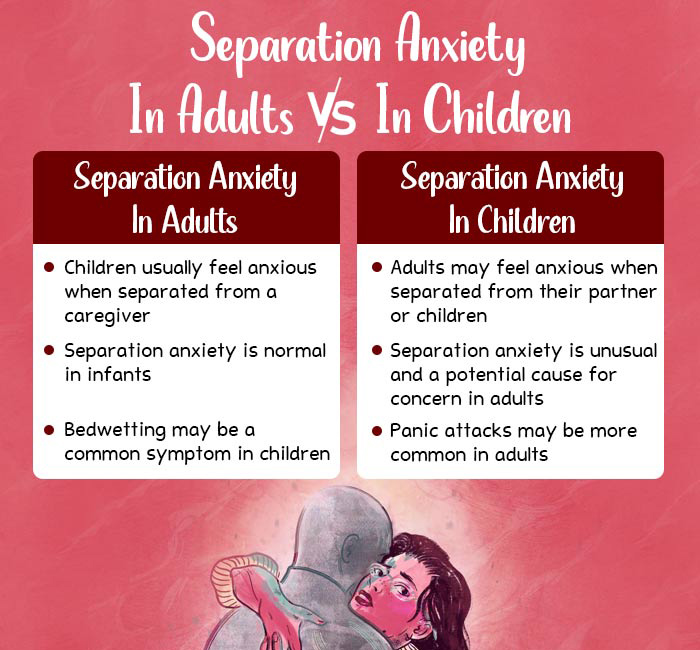
Signs Of Separation Anxiety In Relationships
It is important to distinguish the signs of separation anxiety in relationships from those of other overlapping anxiety and personality disorders.
Look out for these common symptoms of separation anxiety disorder in relationships 3 Phillips, K. E., Norris, L. A., & Kendall, P. C. (2020). Separation Anxiety Symptom Profiles and Parental Accommodation Across Pediatric Anxiety Disorders. Child psychiatry and human development, 51(3), 377–389. https://doi.org/10.1007/s10578-019-00949-7 :
- Excessive worry related to the safety of your partner or a family member and fear of them experiencing an injury, accident, death, etc.
- Feeling of unease when traveling without loved ones
- Discomfort and distress when separated from a partner
- Persistent need to know the whereabouts and activities of the partner or family members
- Persistent fear of being abandoned
- Difficulty in eating or sleeping in the absence of a partner or family members
- General restlessness and irritability
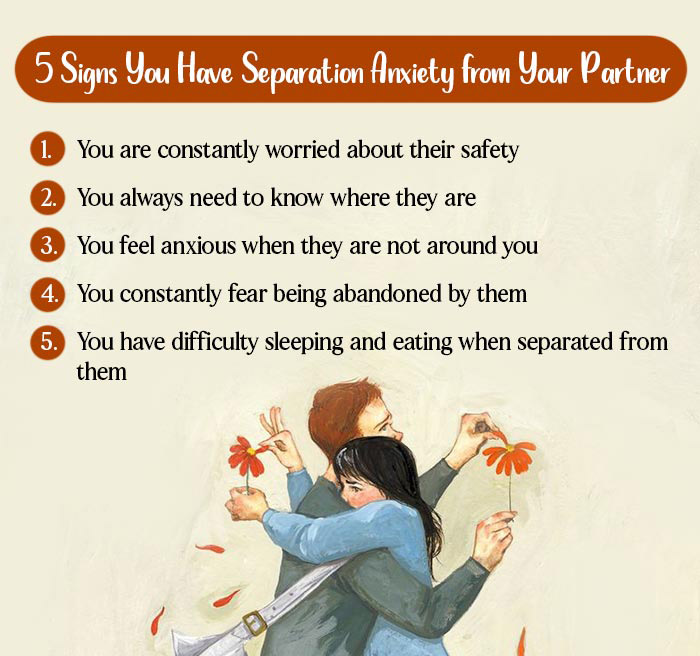
What Causes Separation Anxiety In Relationships?
Various factors may contribute to the development of separation anxiety. Some of the common causes 4 Phillips, K. E., Norris, L. A., & Kendall, P. C. (2020). Separation Anxiety Symptom Profiles and Parental Accommodation Across Pediatric Anxiety Disorders. Child psychiatry and human development, 51(3), 377–389. https://doi.org/10.1007/s10578-019-00949-7 of separation anxiety disorder in relationships may include:
1. Heredity
Separation anxiety disorder has a widespread genetic landscape 5 Silove, D., Manicavasagar, V., O’Connell, D., & Morris-Yates, A. (1995). Genetic factors in early separation anxiety: implications for the genesis of adult anxiety disorders. Acta psychiatrica Scandinavica, 92(1), 17–24. https://doi.org/10.1111/j.1600-0447.1995.tb09537.x and it can be easily inherited 6 Waszczuk, M. A., Zavos, H. M., & Eley, T. C. (2013). Genetic and environmental influences on relationship between anxiety sensitivity and anxiety subscales in children. Journal of anxiety disorders, 27(5), 475–484. https://doi.org/10.1016/j.janxdis.2013.05.008 through both genes and learned behavior.
Research suggests that mothers with separation anxiety are likely to transfer the symptoms to their children 7 Stone, L. L., Otten, R., Soenens, B., Engels, R. C., & Janssens, J. M. (2015). Relations Between Parental and Child Separation Anxiety: The Role of Dependency-Oriented Psychological Control. Journal of child and family studies, 24(11), 3192–3199. https://doi.org/10.1007/s10826-015-0122-x .
2. Neurobiological factors
Separation anxiety disorder is triggered by certain structural and functional changes 8 Martin, E. I., Ressler, K. J., Binder, E., & Nemeroff, C. B. (2009). The neurobiology of anxiety disorders: brain imaging, genetics, and psychoneuroendocrinology. The Psychiatric clinics of North America, 32(3), 549–575. https://doi.org/10.1016/j.psc.2009.05.004 in the brain, such as:
- Circuits in the limbic systems 9 Redlich, R., Grotegerd, D., Opel, N., Kaufmann, C., Zwitserlood, P., Kugel, H., Heindel, W., Donges, U. S., Suslow, T., Arolt, V., & Dannlowski, U. (2015). Are you gonna leave me? Separation anxiety is associated with increased amygdala responsiveness and volume. Social cognitive and affective neuroscience, 10(2), 278–284. https://doi.org/10.1093/scan/nsu055
- Brain stem
- Higher cortical brain areas
3. Adverse childhood experiences
Certain negative childhood experiences 10 Milrod, B., Markowitz, J. C., Gerber, A. J., Cyranowski, J., Altemus, M., Shapiro, T., Hofer, M., & Glatt, C. (2014). Childhood separation anxiety and the pathogenesis and treatment of adult anxiety. The American journal of psychiatry, 171(1), 34–43. https://doi.org/10.1176/appi.ajp.2013.13060781 such as childhood abuse and trauma have been seen to be associated with separation anxiety in relationships.
4. Parenting style
Studies have found that a lack of autonomy during childhood can give rise to anxiety disorders such as separation anxiety. People who grow up with over-permissive mothers and overprotective fathers are more likely to have separation anxiety in adulthood 11 Başbuğ, S., Cesur, G., & Durak Batıgün, A. (2017). Perceived Parental Styles and Adult Separation Anxiety. Algılanan Ebeveynlik Biçimi ve Yetişkin Ayrılma Anksiyetesi: Kişilerarası Bilişsel Çarpıtmaların Aracı Rolü. Turk psikiyatri dergisi = Turkish journal of psychiatry, 28(4), 255–267. .
Read More About Parenting Here
5. Life changes
Certain complex life changes 12 Platt, R., Williams, S. R., & Ginsburg, G. S. (2016). Stressful Life Events and Child Anxiety: Examining Parent and Child Mediators. Child psychiatry and human development, 47(1), 23–34. https://doi.org/10.1007/s10578-015-0540-4 and stress can trigger separation anxiety. However, this anxiety about “falling out of place” or being uncomfortable with accepting change is very different from adjustment disorders. While chronic adjustment issues are chiefly disturbances in conduct, separation anxiety is more of a syndrome triggered by factors like:
- Experiences of personal loss and grief
- Surviving a disaster or traumatic event
- Leaving home for the first time
- Moving to a different place
6. Relationship factors
Certain negative experiences in past relationships may contribute to separation anxiety. Some of these include
- Domestic violence
- Intimate partner violence
- Romantic rejection or abandonment in the past
- Life changes like divorce, parental abandonment, etc.
Read More About Relationships Here
7. Illness and disabilities
Separation anxiety may also develop in people who have a debilitating illness or a chronic disability, as it makes them more dependent on the people around them.
How Does Separation Anxiety Affect Relationships?
Chronic and acute separation anxiety can negatively impact a person’s social relationships 13 Simpson, J. A., & Steven Rholes, W. (2017). Adult Attachment, Stress, and Romantic Relationships. Current opinion in psychology, 13, 19–24. https://doi.org/10.1016/j.copsyc.2016.04.006 . By harboring a persistent and frequent fear of separation and abandonment, a person may appear to be clingy and over-involved in their partner’s or loved ones’ lives. This can trigger issues of personal boundaries and privacy and result in conflict.
Escalating conflict with loved ones and its lack of resolution can in turn severely harm the physical and psychological well-being 14 Zaider, T. I., Heimberg, R. G., & Iida, M. (2010). Anxiety disorders and intimate relationships: a study of daily processes in couples. Journal of abnormal psychology, 119(1), 163–173. https://doi.org/10.1037/a0018473 of the people involved, making them prone to other health conditions.
Some of the mental health effects of separation anxiety in relationships include:
- Depression [Read more]
- Anxiety disorders [Read more]
- Social withdrawal
- Eating disorders [Read more]
- Sleep disorders [Read more]
- Codependency disability 15 Foley, D. L., Rowe, R., Maes, H., Silberg, J., Eaves, L., & Pickles, A. (2008). The relationship between separation anxiety and impairment. Journal of anxiety disorders, 22(4), 635–641. https://doi.org/10.1016/j.janxdis.2007.06.002 , etc. [Read more]
Dealing With Separation Anxiety In Relationships
Given the negative consequences of separation anxiety on individuals suffering from it as well as their partners and loved ones, a pertinent question might be: “How to stop separation anxiety in relationships?”
While it takes sustained therapy to deal with separation anxiety disorder, understanding and admitting that you might have a problem is a big step towards progress.
Some coping skills that may be adopted to overcome separation anxiety in relationships are given below:
- Limit checking in on your partner or family member
- Engage yourself in hobbies and other leisure activities to distract yourself from persistent thoughts about your loved one
- Practice meditation and deep breathing
- Adopt healthy coping mechanisms for dealing with separation such as journaling, talking to other friends, etc.
- Communicate your feelings honestly with your loved ones
- Try to expose yourself to healthy relationships and patterns of behavior
Takeaway
Separation anxiety in romantic relationships or familial relationships can be quite detrimental to the people involved, and end up making a person feel emotionally distressed. It must therefore be addressed in time to prevent future complications. Separation anxiety can be easily managed with the help of therapy, medication, and good coping strategies.
At A glance
- Separation anxiety in relationships is characterized by a recurrent and intense fear of separation and abandonment.
- Symptoms of adult separation anxiety comprise excessive fear of separation, panic attacks, disrupted normal functioning, etc.
- Therapy and medication are effective ways to get rid of separation anxiety in relationships.
- Some ways of coping with separation anxiety include engaging in hobbies, practicing meditation, and communicating with loved ones.

